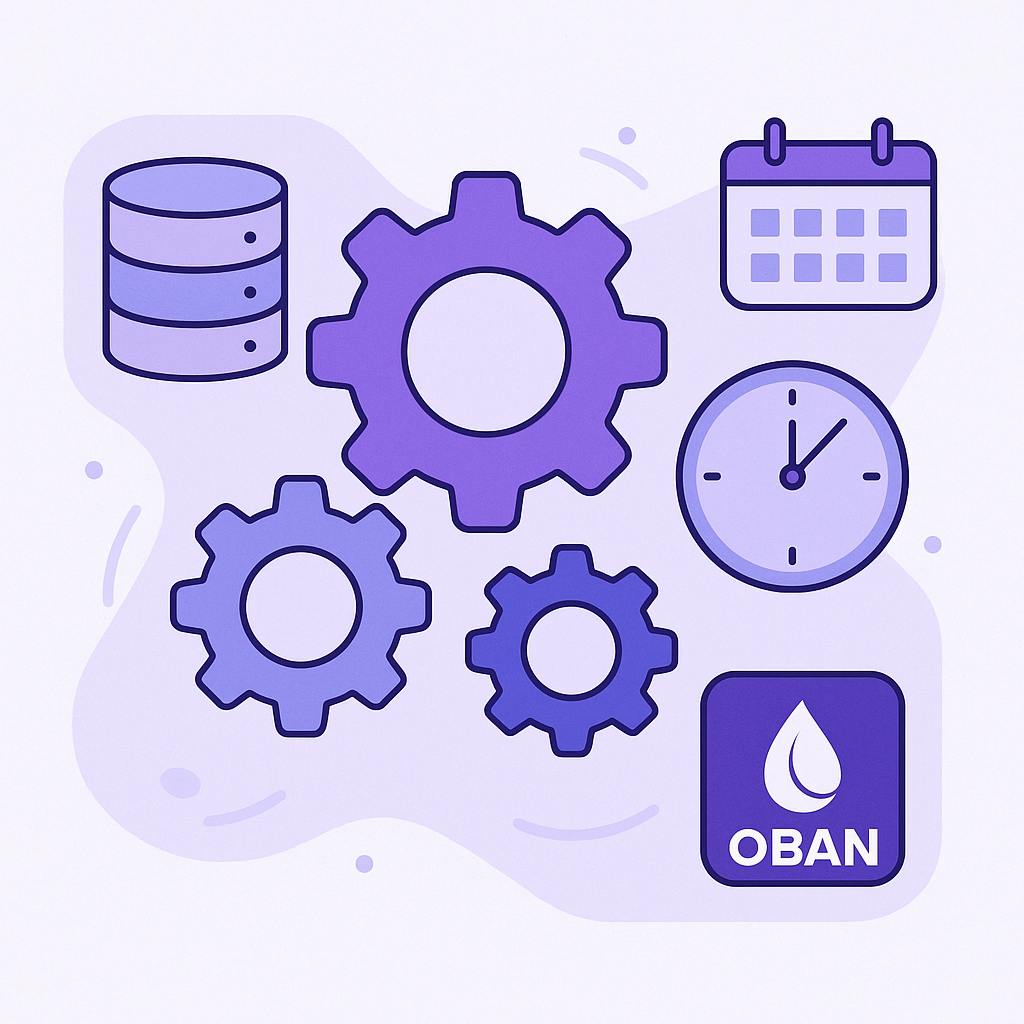In systems that need to handle large volumes of background data — such as billing routines — it’s common to fall into the trap of writing temporary scripts or running manual processes. That’s exactly what we set out to avoid.
In this article, I share how Oban helped us structure a resilient and scalable job system, becoming a core part of our billing process at Nextcode.
The challenge: complex and recurring billing routines
Our scenario involved:
- Processing thousands of usage logs daily
- Fetching logs from different apps and databases
- Applying client-specific and service-specific rules
- Aggregating and generating logs
- Ensuring safe retries in case of failures
- Horizontal scaling without losing traceability
- Storing data in optimized databases for querying
- Running these routines manually or with one-off scripts was risky, especially with no logging or fallback in case of failure
That’s when Oban came into play.
Why we chose Oban
Besides being built in pure Elixir, Oban gave us everything we needed:
✅ PostgreSQL persistence
✅ Automatic retries with backoff
✅ Job deduplication with uniqueness control
✅ Dashboard support via oban_web (yet to try it)
✅ Distributed execution with isolated queues and concurrency
✅ Native Ecto integration and flexibility
Installation
Getting started is simple. Just add the dependency to your mix.exs:
def deps do
[
{:oban, "~> 2.17"},
]
end
Then, configure your repo and supervision tree:
# config/config.exs
config :my_app, Oban,
repo: MyApp.Repo,
plugins: [
{Oban.Plugins.Pruner, max_age: 86_400},
],
queues: [
mongodb_daily_log: 1
]
# application.ex
children = [
{Oban, Application.fetch_env!(:my_app, Oban)}
]
Our worker: MongodbDailyLog
Here’s how we structured one of our workers to process daily logs for billing:
defmodule MyApp.Job.MongodbDailyLog do
use Oban.Worker,
queue: :mongodb_daily_log,
max_attempts: 2,
unique: [
fields: [:args],
states: [:available, :scheduled, :executing],
period: 60
]
What does this do?
- Assigns a specific queue for the job
- Limits each job to 2 attempts
- Enforces uniqueness to avoid duplicate executions with the same arguments
Automatic scheduling and safe execution
Our job can be triggered either automatically or on-demand. We use Timex to handle dates and define the processing window:
def perform(%Oban.Job{args: %{"date" => %{"day" => d, "month" => m, "year" => y}, "only_logs" => only_logs}}) do
date = Timex.to_date({y, m, d})
gte = Timex.to_datetime(date, "America/Sao_Paulo")
lt = Timex.shift(gte, days: 1)
job_impl().run(%{gte: gte, lt: lt}, only_logs)
end
Default execution for previous day if no date is specified:
def perform(%Oban.Job{args: %{}}) do
%{day: d, month: m, year: y} = Timex.shift(Timex.today(), days: -1)
%Oban.Job{args: %{"date" => %{"day" => d, "month" => m, "year" => y}, "only_logs" => false}}
|> perform()
end
Deduplication and execution
We run the job with deduplication to prevent accidental duplicates:
def run(%Date{} = date \ Timex.shift(Timex.today(), days: -1), only_logs \ false) do
%{day: day, month: month, year: year} = date
job =
%{date: %{day: day, month: month, year: year}, only_logs: only_logs}
|> NextID.Job.MongodbDailyLog.new()
with {:ok, %Oban.Job{conflict?: true}} <- Oban.insert(job) do
{:error, :job_already_exists}
end
end
Historical processing? No problem.
Need to backfill historical data? We created a method that recursively schedules jobs by date:
def run_history(%Date{} = date \ Timex.today()) do
case Timex.before?(date, ~D[2021-08-01]) do
false ->
run(date, true)
run_history(Timex.shift(date, days: -1))
true -> :ok
end
end
Results
- We automated daily log processing with high reliability
- Achieved horizontal scalability by splitting queues by task type
- Eliminated duplication issues while maintaining traceability
- Reduced manual work and reprocessing effort
- Gained full visibility and control over all jobs — for now, straight from PostgreSQL
Conclusion
Oban turned out to be a robust, easy-to-implement, and well-integrated solution within the Elixir ecosystem. Today, it’s a foundational part of our billing system — and we’re already expanding its use to other parts of the product.
If you’re dealing with critical background processing like billing, I highly recommend giving it a try.
📚 Official Oban repo: github.com/oban-bg/oban
💡 About Nextcode: https://nxcd.com.br
💬 Want to chat about how we’re using it? Reach out!


